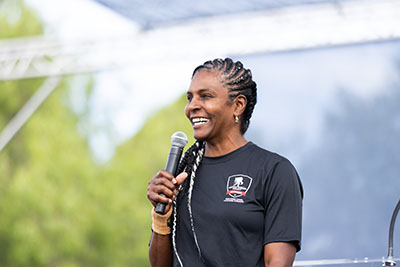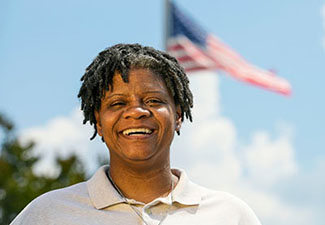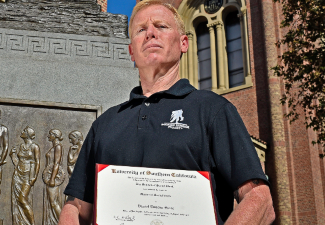How Warrior Care Network Accelerates Mental Health and PTSD Recovery for Veterans

Healing from the mental and emotional challenges of military life is a crucial step in a veteran's transition from military service. Some veterans face a range of complex needs that can significantly impact their well-being.
Wounded Warrior Project® (WWP) surveys show mental health conditions are among the most common health issues affecting post-9/11 veterans registered for its services. In WWP's most recent Warrior Survey,* 76% of the veterans self-reported PTSD. Incidents of head-related trauma, which can impact brain health, are also higher among those who served since 2000.
When warriors reported struggling to find effective care for these issues, WWP™ established Warrior Care Network®—a collaborative program that empowers veterans, service members, and their families to heal from the disruptive effects of post-traumatic stress disorder (PTSD), traumatic brain injury (TBI), military sexual trauma (MST), substance use disorder, and other related conditions.
How Does Warrior Care Network Address Trauma?
Warrior Care Network offers accelerated brain health programs hosted by leading academic medical centers. During a two-week individualized program, participants receive a personalized combination of treatments and wellness services at no cost. Since its founding in 2015, Warrior Care Network has provided over 300,000 hours of clinical care to more than 5,000 warriors nationwide.
Warriors attend in small groups alongside other veterans in a supportive setting.
Among the services Warrior Care Network offers:
- Individual and group therapy sessions.
- Family support and resources.
- Fitness and nutrition education.
- Alternative therapies such as yoga, art, tai chi, and equine therapy.
Recognizing that travel and time away can add stress to the process, Warrior Care Network provides a dedicated specialist to help participants with everything from pre-participation paperwork to travel and lodging arrangements, dietary needs, and even coordinating care for pets.
"Wounded Warrior Project understands the needs and challenges of our nation's post-9/11 veterans," said Dr. Erin Fletcher, director of Warrior Care Network. "We know many warriors experience similar symptoms of post-traumatic stress, or with a traumatic brain injury, but we also know a cookie-cutter approach to care is not the most effective."
Collaborative Network Approach
Wounded Warrior Project leads Warrior Care Network in partnership with veteran brain health at four nationally known medical centers:

- Emory Healthcare Veterans Program
- Home Base (Massachusetts General Hospital)
- Operation Mend (UCLA Health)
- The Road Home Program (RUSH)
"Our partners bring the latest in mental and brain health care so we can deliver the most effective care that is tailored to each warrior," explained Dr. Fletcher. "Understanding what strategies will work best for our warriors is crucial to their long-term success."
A knowledge-sharing agreement across the partnership allows for new advances, best practices, and research to be quickly evaluated and leveraged across the network.
"We are constantly reviewing and identifying potential new therapies and evolving to integrate the latest in mental and brain health care," Dr. Fletcher added.
"We know the journey may feel uncomfortable or overwhelming, which is why Wounded Warrior Project provides support every step of the way. We ask our program participants to trust in the process as they gain lasting knowledge, tools, and techniques to help them navigate their mental health journey and live their best life."
Faster Results Than Traditional Mental Health Treatment
The impact of Warrior Care Network is evident in the improvements reported by participants. Results from the 5,000 veterans who completed the program show:

Chris Hoff found great value in equine therapy.
- Veterans who enter Warrior Care Network with severe PTSD can reduce their symptoms to moderate or mild levels in two weeks, on average. Research estimates typical therapy takes three to four months for similar results.
- Nine in 10 veterans finish the treatment, a significantly higher rate than traditional treatment options.
- Warrior Care Network reduces depression symptoms comparable to a standard three-to-four-month program.
- Studies show that participants continue to benefit from treatment for at least one year after completing the program.
- Over 95% of participants said they would recommend the program to a fellow warrior.
Watch: U.S. Army veteran Chris Hoff on Warrior Care Network and overcoming TBI and trauma
Accelerating PTSD Treatment Through Innovation and Research
Warrior Care Network has the advantage of being nimble, which helps to bridge the gap between research and routine clinical care. Their agility allows the teams to develop, test, and implement new treatments much faster than traditional care systems.

Tonya Oxendine shares her story often about how she benefitted from Warrior Care Network.
Technology is changing both the delivery and access to mental health care. Funding from Wounded Warrior Project has helped accelerate research at Warrior Care Network to explore ways technology can improve treatment and outcomes.
Research has led to the implementation of new treatments in areas such as:
- Virtual reality: Used in combination with prolonged exposure therapy to help veterans confront traumatic memories in a safe, controlled environment.
- Repetitive transcranial magnetic stimulation: Non-invasive brain treatment used to address PTSD.
- Artificial intelligence (AI): Machine learning that can help predict which treatment options will be most effective for each veteran. AI is also helping to adjust treatment in real time to improve outcomes.
Read: how virtual reality helped U.S. Army veteran Tonya Oxendine triumph over PTSD
Treating Substance Use and PTSD Simultaneously
According to the Department of Veterans Affairs (VA), more than 2 in 10 veterans with PTSD also have substance use disorder. Obstacles often line the road to recovery for warriors struggling with substance use, but a clearer path to healing is within reach, thanks to WWP. Warrior Care Network began offering treatment for substance use disorder alongside treatment for PTSD.

Issac Malone and his whole family benefitted from Warrior Care Network.
For many years, VA did not consider alcoholism a disease that qualified for treatment. A 2020 RAND study commissioned by WWP showed substance use remained a significant barrier to mental health treatment access.
"Many veterans were being told they needed to get sober before they could get PTSD treatment. However, we know untreated PTSD may be one of the factors driving someone to use various substances," explained Dr. Fletcher, adding that WWP's most recent Warrior Survey* found substance use was twice as common among warriors who had two or more mental health conditions, including PTSD.
"Recognizing there was still a barrier for veterans to receive effective treatment, Warrior Care Network prioritized specialty care. Since 2021, we've been able to support veterans needing care for PTSD or brain injuries as well as substance use," she added.
Read: the Malone Family Finds A New Beginning Thanks to Warrior Care Network
Culturally Competent Care

Ysabel Cardona appreciated being with other women warriors at Warrior Care Network.
Warrior Care Network provides personalized, culturally sensitive care. Each academic medical center understands the importance of delivering care that respects a veteran's unique cultural background and needs. This approach creates a supportive environment where warriors feel seen and understood, leading to more effective treatment outcomes.
Recognizing veterans' diverse backgrounds, Warrior Care Network also offers specialized cohorts tailored to specific groups, including women warriors, MST survivors, and special forces members.
"We believe that culturally competent care is essential for our warriors to receive the most effective outcomes," said Dr. Fletcher. "By offering specialized cohorts that respect cultural beliefs or needs, we create a supportive environment where veterans feel understood and valued."
A dedicated engagement specialist is available to help each warrior receive any personalized support they may need before, during, and after attendance at Warrior Care Network.
Read: U.S. Navy veteran Ysabel Cardona Finds New Purpose after Warrior Care Network
Global Excellence in Treating Trauma
Warrior Care Network's dedication to effectively treating veterans has not gone unnoticed. In September 2024, the program was recognized with the 2024 Sarah Haley Memorial Award for Clinical Excellence by the International Society of Traumatic Stress Studies. This global award honors a clinician or group that demonstrates exceptional care for traumatized individuals.
"We are incredibly honored to be recognized with the Sarah Haley Memorial Award," said Dr. Fletcher. "It is a reflection of the dedication and passion of our entire team, of all our partners, and the staff who work together, striving for excellence to help our veterans reduce disruptive symptoms, rebuild relationships, and thrive for a lifetime."
The Future of Mental Well-Being
To date, WWP has invested more than $336 million in Warrior Care Network. As the partnership continues to evolve, its mission remains clear: to provide the highest-quality care for veterans and their families while advancing the mental and brain health field.
"While data continues to illustrate the effectiveness of the accelerated brain health treatment program, advancements are always on the horizon," said Dr. Fletcher. "We are constantly looking for ways to improve and expand our services to help as many warriors heal from their invisible wounds. Our goal is to ensure that every veteran who needs help can access the care they deserve."
Learn more about WWP's mental health and wellness resources, which are available to warriors and their families.
*Warrior Survey, Wave 2 (conducted June 15-Aug. 24, 2022)
Contact: Cynthia Weiss – Public Relations, cweiss@woundedwarriorproject.org, 904. 738.2589
About Wounded Warrior Project
Since 2003, Wounded Warrior Project® (WWP) has been meeting the growing needs of warriors, their families, and caregivers — helping them achieve their highest ambition. Learn more about Wounded Warrior Project.


